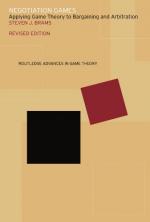|
This section contains 1,773 words (approx. 6 pages at 300 words per page) |

|
Games of Complete Information
A game is an abstract, formal description of a strategic interaction. Any strategic interaction involves two or more decision makers (players), each with two or more ways of acting (strategies), such that the outcome depends on the strategy choices of all the players. Each player has well-defined preferences among all the possible outcomes, enabling corresponding utilities (payoffs) to be assigned. A game makes explicit the rules governing players' interaction, the players' feasible strategies, and their preferences over outcomes. Game theory describes games by means of mathematical concepts (e.g., sets, functions, and relations).
Normal Form
A possible representation of a game is in normal form. A normal form game is completely defined by three elements that constitute the structure of the game: a list of players i = 1, …, n; for each player i; a finite set of pure strategies Si; and a...
|
This section contains 1,773 words (approx. 6 pages at 300 words per page) |

|


